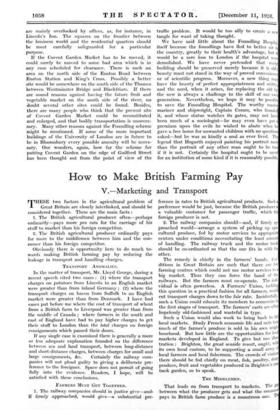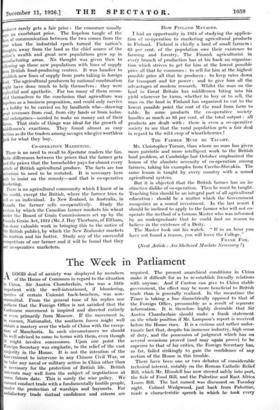How to Make British Farming Pay
V.—Marketing and Transport
T"sE two factors in the agricultural problem of Great Britain are closely interlinked, and should be considered together. These are the main facts : 1. The British agricultural producer often—perhaps ordinarily—pays more pro rata for the carriage of his stuff to market than his foreign competitor.
2. The British agricultural producer ordinarily pays far more to the middlemen between him and the con- sumer than his foreign competitor.
Obviously there is opportunity here to do much to- wards making British farming pay by reducing the leakage in transport and handling charges.
TRANSPORT ANOMALIES.
In the matter of transport, Mr. Lloyd George, during a recent speech cited two eases : (1) where the transport charges on potatoes from Lincoln to an English market were greater than from inland Germany ; (2) where the transport charges on bacon from Suffolk to an English market were greater than from Denmark. I have had cases put before me where the cost of transport of wheat from a British farm to Liverpool was greater than from the middle of Canada ; where farmers in the south and east of England have had to pay higher charges to get their stuff to London than the total charges on foreign consignments which passed their doors.
If any single case is examined there is generally a more or less adequate explanation founded on the difference between sea and land transport, between long-distance and short-distance charges, between charges for small and large consignments, &c. Certainly the railway corn- panies will not plead guilty to giving a deliberate pre- ference to the foreigner. Space does not permit of going fully into the evidence. Readers, I hope, will be satisfied with these conclusions.
FARMERS MUST GET TOGETHER.
L The railway companies should in justice give—and, if firmly approached, would give—a substantial pre- ference in rates to British agricultural products. Such preference would be just, because the British producer • a valuable customer for passenger traffic, which th foreign producer is not.
2. The railway companies should—and, if firmly ap. proached would—arrange a system of picking up agri. cultural produce, fed by motor services to appropria centres under conditions necessitating the least amoun of handling. The railway truck and the motor truck should be co-ordinated so that the one fits in with t other.
The remedy is chiefly in the farmers' hands. Con. ditions in Great Britain are such that there are kit farming centres which could not use motor services to a big market. Thus they can force the hand of the railways. But the farmers must co-operate. The le& vidual is often powerless. A Farmers' Union, tacklina this question in a practical fashion for all farmers, would cut transport charges down to the fair rate. Incidentally, such a Union could educate its members to economize la the first stages of transport. The farmers' carts are often hopelessly old-fashioned and wasteful in type. Such a Union would also work to bring back to lif local markets. Study French economic life and note ho much of the farmer's produce is sold in his own neig' bourhood. But how little are the opportunities for I markets developed in England. To give but one ill tration : Brighton, the great seaside resort, ought, 111 its own local custom, to be supporting a small army local farmers and local fishermen. The crowds of visit° there should be fed chiefly on meat, fish, poultry, d: produce, fruit and vegetables produced in Brighton's o back garden, so to speak.
THE MIDDLEMEN.
That leads on from transport to. markets. The between what the producer gets and what the con pays in British farm produce is a monstrous one. roducer rarely gets a fair price : the consumer usually vs an exorbitant price. The hopeless tangle of the es of communication between the two comes from the le when the industrial epoch turned the nation's houghts away from the land as the chief source of the ation's wealth and great new populations grew up in anufacturing areas. No thought was given then to allowing up these new populations with lines of supply ni British food-producing centres. It was handier to tablish new lines of supply from ports taking in foreign ood. The agricultural producers by national combination fight have done much to help themselves : they were eglectful and apathetic. Far too many of them recon- • ed themselves to the conclusion that agriculture was opeless as a business proposition, and could only survive a hobby to be carried on by landlords who—drawing at revenues from coal, from city lands or from indus- rial enterprises—needed to make no money out of their arms. That state of things was ideal for the growth of ,iddlemen's exactions. They found almost as easy etims as do the traders among savages who give worthless unk for what they buy.
CO-OPERATIVE MARKETING.
There is no need to recall to Spectator readers the fan- astic differences between the prices that the farmer gets d the prices that the householder pays for almost every rtiele of British agricultural produce. The facts are too otorious to need to be restated. It is necessary here )1y to insist on the remedy—and that is co-operative idrketing.
There is no agricultural community which I know of in he world, except the British, where the farmer tries to ell as an individual. In New Zealand, in Australia, in anada the farmer sells co-operatively. Study the -stem by which the Canadian farmer markets his wheat nder the Board of Grain Commissioners set up by the anada Grain Act, 1912 (Mr. J. Hay Thorburn, of Eltham, as done valuable work in bringing this to the notice of he British public), by which the New Zealander markets is mutton and his butter. Study any of the successful mpetitors of our farmer and it will be found that they co-operative marketers. How FINLAND MANAGES.
I had an opportunity in 1924 of studying the applica- tion of co-operation to marketing agricultural products in Finland. Finland is chiefly a land of small farmers : 65 per cent. of the population owe their existence to farming and forestry. The Finnish agriculturist in every branch of production has at his back an organiza- tion which strives to get for him at the lowest possible price all that he consumes : to sell for him at the highest possible price all that he produces : to keep rates down for transport and for power : and to give him all the advantages of modern research. Whilst the man on the land in Great Britain has middlemen biting into his yield wherever he turns, whether to buy or to sell, the man on the land in Finland has organized to cut to the lowest possible point the cost' of the road from farm to table. In some products the co-operative society handles as much as 95 per cent. of the total output : all products are dealt with : there is even a co-operative society to see that the rural population gets a fair deal in regard to the wild crop of whortleberries !
THE FARMER MUST BE TAUGHT.
Mr. Christopher Tumor, than whom no man has given more patriotic and more intelligent work to the British land problem, at Cambridge last October emphasized the lesson of the absolute necessity of co-operation among farmers, taking his examples from Czecho-Slovakia. The same lesson is taught by every country with a sound agricultural system.
But it is objected that the British farmer has an in- stinctive dislike of co-operation. Then he must be taught. Teaching him should be an integral part of all agricultural education : should be a matter which the Government recognizes as a sound investment. In the last resort I should be inclined to apply to the farmer who will not co- operate the method of a famous Master who was informed by an undergraduate that he could find no reason to believe in the existence of a Deity.
The Master took out his watch. " If in an hour you have not found a reason, you will leave the College."
FRANK Fox.
(Next Article : Are Sheltered Markets Necessary ?)















































 Previous page
Previous page